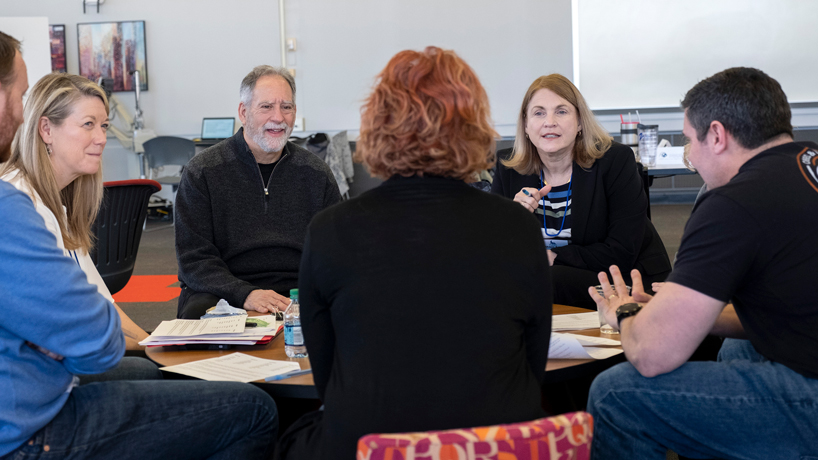
Marvin Berkowitz (facing camera, left) and Melinda Bier (facing camera, right) are co-directors of the Center for Character and Citizenship, which is housed in the UMSL College of Education and positioning itself as an international thought leader in the realm of character education. (Photo by August Jennewein)
January wasn’t even over and Marvin Berkowitz had already served as an international expert on character education in the United Kingdom and the United Arab Emirates to kick off 2019.
His calendar for the rest of the year, too, was nearly full. He had business trips to Singapore, Taiwan, Hong Kong, Colombia and Germany on the books.
“And other countries are asking me, and I’m just saying, ‘Nah. I can’t. I’m just too busy,’” says Berkowitz, one of the co-directors of the Center for Character and Citizenship at the University of Missouri–St. Louis.
Such is the life of one of the world’s foremost experts in character education, a learning philosophy that prizes nurturing the development of core ethical values, virtues and critical thinking for students and school leaders alongside more traditional scholastic disciplines.
Berkowitz is the public face of the center, which exports research, programming and tutelage from its home at the UMSL College of Education to regional, national and international audiences of school and civic leaders.
Countries such as the UAE and Colombia are calling upon the center’s resources to inform national pushes in character education. Scholars in Indonesia are citing Berkowitz’s papers on a daily basis as that nation moves toward a character education curriculum in schools.
That’s not to say people are ignoring the center’s work domestically. In fact, interest in character education is on the rise in the U.S., says Melinda Bier, co-director of the CCC. Positive findings from multiple scientific disciplines are combining with relatively new and large-scale philanthropic support to push the field forward.
Character education is even attracting the renewed support of government agencies. The final report of the Federal Commission on School Safety, a joint effort of the departments of Education, Homeland Security, Health and Human Services and Justice that was presented to President Donald Trump in December, devoted a whole chapter to character education. Berkowitz’s PRIMED – prioritization, relationships, intrinsic motivation, modeling, empowerment and developmental pedagogy – model, which Bier helped develop, was included among the commission’s five recommendations.
As one of the center founders, Bier has been instrumental to its success, most recently by securing close to $6 million in external funding to support the CCC’s leadership work.
The latest grant from the John Templeton Foundation is supporting the further development and evaluation of Bier’s Cultivating Virtue in Leaders program, which seeks to promote and measure the growth of servant leader practices in 100 educational leaders over the next three years.
“While many of today’s educational leaders have been conditioned to think of leadership in terms of applying power to impose control on staff and students, servant leadership promotes a different motivational mindset and educational vision,” Bier says. “Servant leaders seek to establish ethical and caring environments and promote the achievement of school goals by developing and building on the strengths and commitments of the entire school community.”
The Kern Family Foundation is providing support for a new multiyear professional development and mentoring experience, one specifically aimed at emerging school leaders. The program, called Character Education in Emerging Leaders, merges CViL’s emphasis on the personal and professional development of servant leadership virtues with the whole-school transformation mission of the well-established Leadership Academy in Character Education.
Because of the blended-learning, video-based presentation of some of the material, the center’s resources can be exported anywhere. The CCC has already experienced success widening availability to its LACE program, which has accounted locally for nearly one in five national schools and districts of character across the U.S. over the past decade, in this manner.
The CCC has been growing since its founding. It currently has 18 full- or part-time staff including two endowed professors, three postdoctoral fellows, three national award-winning school leaders, two doctoral students and a senior scholar. It also has a network of local and national leading scholars and practitioners, along with a set of master’s and doctoral-level graduate students.
Character education is also making some inroads into the UMSL College of Education’s educational leadership postgraduate programs. With Dean Ann Taylor on board, the Department of Educator Preparation and Leadership has added a required course in character education into the curriculum, with a possible leadership/character cohort in the EdD program down the road.
“I tell principals all the time that, if they are effective at getting every teacher to be the best they can be, then they can sit in their office and play Angry Birds all day long and the school is going to be great,” Berkowitz says. “The primary task is serving the optimal professional development of everybody in the school, shifting that mindset to a focus on helping teachers be the best they can be. Ultimately this is about building a better world by nurturing the flourishing of human goodness in people.”
A version of this story was originally published in the spring 2019 issue of UMSL Magazine. If you have a story idea for UMSL Magazine, email magazine@umsl.edu.














